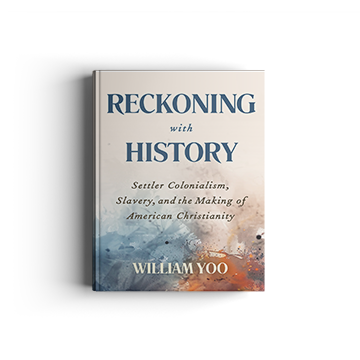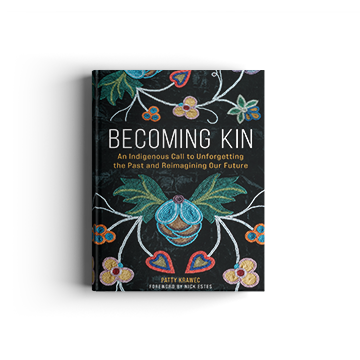take and read

Reckoning with History: Settler Colonialism, Slavery, and the Making
of American Christianity
By William Yoo
(Westminster John Knox Press 2025)

Why Indigenous Literatures Matter
By Daniel Heath Justice
(Wilfrid Laurier
University Press 2018)

Becoming Kin: An Indigenous Call to Unforgetting the
Past and Reimagining
Our Future
By Patty Krawec
(Broadleaf Books 2022)
William Apess knew the world that Christians in America would inherit would be a confused one. Even so, he knew it would not be too late. Apess, a Pequot (a Native American people of southern New England) and a Methodist preacher in the early 19th century, stood between two worlds. He was a Christian by faith, a Pequot by birth, and a minister by choice who spent his adult life as a missionary and lecturer in Massachusetts advocating for equality in America, sharing the conviction that all were made in the image of God.
In a new book, historian William Yoo makes the case for our attention today to Apess’ experience. In Reckoning with History: Settler Colonialism, Slavery, and the Making of American Christianity, he writes:
One common thread across the stories of the Indigenous Christians, Black Christians, and white Indigenous rights activists and abolitionists featured in this book is that they all wrestled with disappointment. Their love for God and neighbor was steadfast, but they had to reconcile their faith in God with the apathy and opposition they encountered in many American churches. Not every church was bad, but not enough of them were good.
Not every church was bad, but not enough of them were good.
Professor, author, and researcher in early American literature and Native American studies Hilary E. Wyss argues that Apess’ story makes way for a deeper understanding of the manipulation of the native voice in 19th-century narratives. Professor of English Maureen Konkle maintains that Apess understood that colonization depended upon the production of knowledge — in this case by Europeans about Native people — and Apess’ work, especially his “Eulogy on King Philip,” she argues, directly engaged this conversation. Yoo writes, in Reckoning with History, that Apess’ story also makes way for a deeper understanding of the church in America.
Apess was positioned at an intersection of cultures in America, a leader both in the Pequot community and in the Methodist Protestant Church. Some scholars have credited him as the first Native American to write and publish an autobiography. Whether his was the first or not, his story, A Son of the Forest, stands apart, breaking conventions common in conversion and captive narratives of the time.
Apess did not entirely reject native modes of living, yet he embraced Christianity at the same time. He resisted conflating two significant pieces of his identity — his faith and his nationality — into a singular marker of who he was. Moreover, he called on the teachings of the church to embrace Native American pride.
The creation of american christianity
The settler-colonial period in America, estimated to be from the 1600s to the 1780s, significantly shaped the path of the church in America, Yoo argues, highlighting the phenomenon of “a clear theological merging of Protestant Christianity with American exceptionalism.”
In other words, as time passed, Christianity in America came to mean a certain kind of American Christianity.
“Nothing inspires, provokes, animates, or divides like nationalism or faith,” Yoo writes. Considering this, he argues that “the origin story of American Christianity is even more potent, because it is a welding of how we understand ourselves as Americans and Christians.”
Apess advocated for a particular decoupling of this, seeing the dangers of confusing the two, nation and faith that is, having witnessed the darkest version of what that could become. In his final public lecture in 1836, he reflected on the history of Christianity in America as his part of the world had experienced it. “Eulogy on King Philip” was for the Wampanoag sachem, who was killed more than 150 years earlier, on the anniversary of his death, during, Yoo writes, a “decisive war from 1675 to 1676 that enabled the English colonists to exert complete dominion over Indigenous peoples in Massachusetts.”
In “Eulogy,” Apess says of colonists motivated by economy and power: “How they could go to work to enslave a free people and call it religion is beyond the power of my imagination and outstrips the revelation of God’s word. … Power was not given us to abuse each other, but a mere power delegated to us by the King of heaven, a weapon of defense against error and evil; and when abused, it will turn to our destruction.”
“The task of Christian ministry among Indigenous peoples was primarily a confrontation with the messy sins of settler colonialism,” Yoo explains.
What Could Be
Apess was not alone in this work. In fact, “Indigenous peoples and a few white Americans, ranging from government officers to missionaries, endeavored to make a nation that preserved Indigenous lifeways and protected Indigenous territories,” Yoo writes. These efforts, however, could not withstand the decisions of more powerful people.
Apess at once rebuked Christians for shaping their faith into what they wanted it to be — one confused with economic reward, prosperity, conquest — and pointed toward a better way. Yoo writes of his approach to discipleship: “The principles of Christian discipleship were evident to Apess and encapsulated in Matthew 22:37–40, a scriptural passage that recounts Jesus’ answer that love for God and love for neighbor are the two greatest commandments.”
Apess spoke of a church that could be, and he demonstrated the necessity of the past in order to press on in the future. “The difference has to do with Apess’s insistence on giving this history a contemporary resonance, connecting the past treatment of Indians to present policy and calling for change,” Barry O’Connell, editor of On Our Own Ground, The Complete Writings of William Apess, a Pequot, writes. “For him, history was to be not an excuse for nostalgia or vain regret but an accounting of what had been and what might yet be done differently.”
For what could be, Apess looked to heaven. In a sermon titled “The Increase of the Kingdom of Christ,” he says:
All that is good is in heaven. All that is glorious is there. All that is permanent is there. No change comes there — no sickness — no death — no grief — no wasting remorse-no bitter memory-no secret sung — no disturbing jealousy-no envy of the soul, pining away because another is great or beloved.





